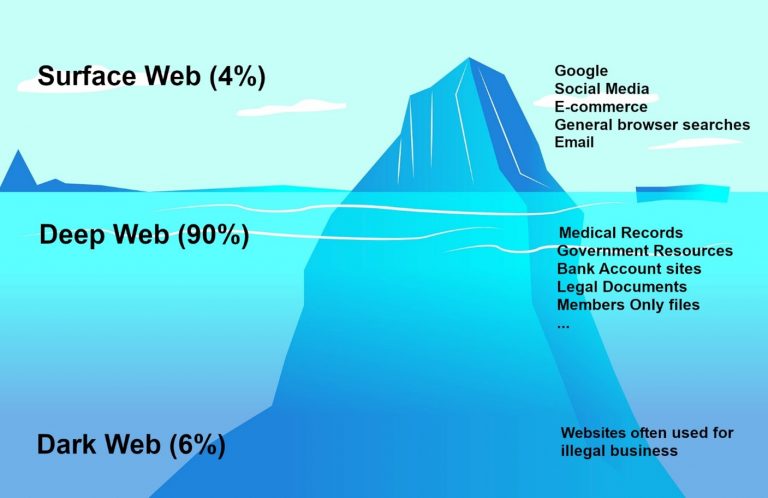
Source: Pexels
Dark web criminals pose the biggest threat to businesses in the marketplaces that deal in leaked or stolen company data. This could include sensitive employee information like social security numbers, proprietary formulas or processes, credit card details, or financial records.
Your company information could be used to infiltrate your network and obtain something more valuable, to commit identity theft or fraud, or used simply as a demonstration of what a hacker is capable of achieving.
Some above-board, and even good, does come from using the dark web, such as keeping investigative journalists’ locations hidden and safe and protecting classified information from opportunistic hackers.
But there is still a great number of criminal activities taking place. A study conducted by Dr. Michael Mcguire of The University of Surrey’s Crime Research Lab found a 20% rise in the number of dark net listings.[1] It also revealed that cybercrime yields $1.5 trillion in revenue per year.[2] That’s almost as much as the top 10 largest economies in the world.
It’s important for your business to stay informed and prepared to prevent the worst from happening. Employing a cyber security company is the best form of precaution.
The “dark web” is what we call the area of the internet that can’t be indexed or crawled by traditional search engines like Google, Yahoo, or Bing. Not all websites on the dark web are illegal, but they don’t have the same objectives as traditional sites.
Websites on the traditional worldwide web want to be found; that’s how they make sales and grow their business. Sites that operate on the dark web are more interested in security, confidentiality, and anonymity. Users must run a suite of security tools to uphold that anonymity.
Can I Check if My Data Is Already on the Dark Web?
You can, but it’s not recommended. It’s possible to set up a secured connection and install a dark web browser. Once you’re online, you would have to know where to look for your potentially stolen information.
This would require a lot of skilled digging around, and the dark web is hardly the place for casual surfing.
There are services that offer dark web monitoring. They will scan sites on the dark web for your data and alert you. If anything is located, you would be facing system-wide updates and password changes, at the very least.
Don’t be confused by the differences between what’s known as the “dark web” and the greater “deep web.” The deep web hosts many legitimate operations and even government files that require an added layer of confidentiality.

The dark web is where more of the highly nefarious activities are happening, such as arms dealing, illegal pornography, and identity theft.
Here are a few simple ways your business can protect itself against the devious plans of criminals on the dark web.
Your in-house IT or cyber security experts should ensure that all accounts accessing private or sensitive information require complex, multi-style character passwords.
All passwords should be changed frequently. For an added layer of security, require password changes to take place at an irregular interval and not on a predictable schedule.
Encourage your staff to be clever with password reset security questions. The most obvious answer is always going to be the least secure. They can use memorable fake answers for family name questions, like nicknames, or choose the opposite side of the family than what’s listed. Use the name of a dog you wish you had or your neighbor’s dog instead of a real pet.
This should go without saying, but unfortunately, at LDD Consulting, we know all too well that it’s common practice. Instruct your team to avoid using the same username and password across multiple accounts. Always.
Installing cyber security solutions such as firewalls, reliable antivirus, and anti-spyware software is the simplest place to start for protecting your network. These all work together to provide the first line of defense against phishing attempts and malware attacks.
Install a “VPN”, or virtual private network, to protect your business from dark web hackers. A VPN will hide your location and browsing history data to keep it out of criminal hands.
You should also utilize a two-factor authentication (2FA) system. This process can make access to your online accounts much more difficult and is one of the most effective ways to block hackers.
Every business should have strong internet use guidelines for what is and is not safe to surf.
All staff should be trained on what a suspicious link looks like and how to spot phishing attempts.
IBM’s Cyber Security Intelligence Index reports that over 95% investigated incidents note “human error” as a contributing factor.[3] Employee security training is key to creating a cyber aware culture.
Consider implementing a strict policy related to the use of company wifi on personal devices or set up a separate wifi portal for this purpose.
Double-check the security of sites your team is accessing and confirm that checkout pages are secure. This can be verified when the beginning of the web address starts with “https” instead of “http.” The extra “s” is for “secure” and will show a padlock icon in the far left of the address bar.
Establishing a greater level of cyber security for your company is not to protect your information “just in case.” The question is not if you may be at risk of an attack, but when the attack will take place.
How great is your risk, and what are you and your team willing to implement to prevent the worst from happening? Once lost, restoration of data is often costly, time-consuming, and incomplete.
You know the old saying, “an ounce of preparation is worth a pound of cure.” We’ve personally seen what happens when this sound advice is ignored.
Prevention methods such as network monitoring and high-level security software can make the difference between a cyber attack you can’t recover from, and a blip on the radar you didn’t even know was happening.
Don’t let your business be a hacker’s statistic.
To learn more about how you can protect your operation, book your free consultation with the cyber security experts at LDD consulting—a premier cyber security company in Albuquerque, New Mexico. We specialize in helping businesses like yours protect their investments and their information by taking necessary and effective cyber precautions.
You can also subscribe to The Reboot, an online video channel where highly qualified IT professionals come together to share industry information and helpful tips for companies like yours.
Important! We hate spam as much (or more!) than you and promise to NEVER rent, share, or abuse your e-mail address and contact information in any way.